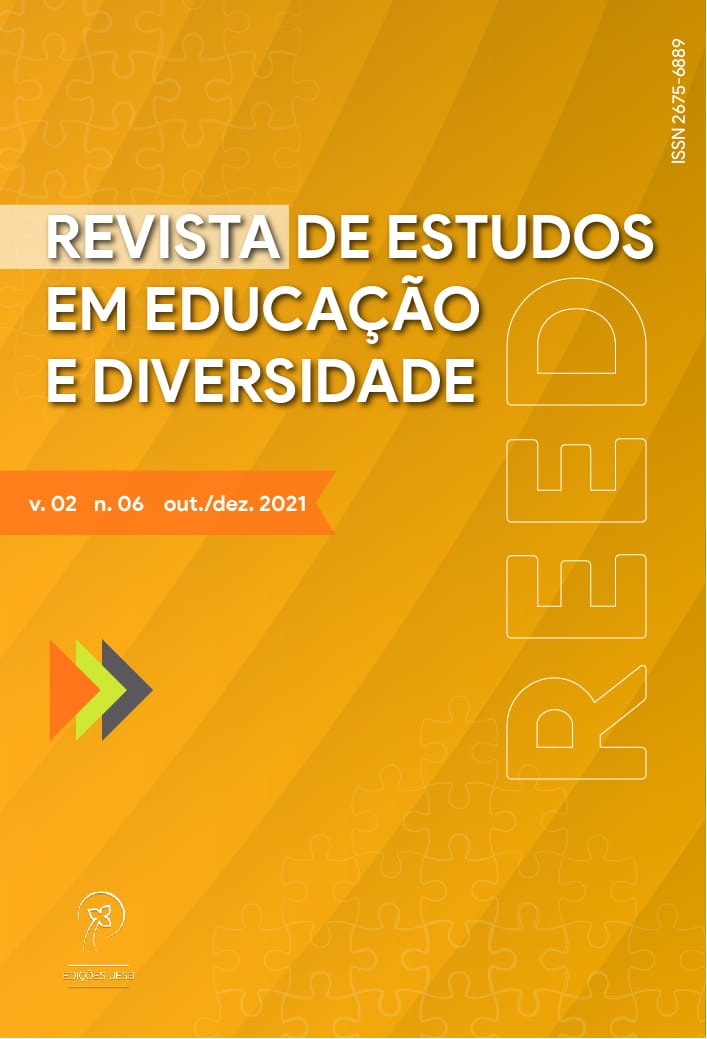THE DIMENSION OF PROFESSIONAL SOCIALIZATION OF TEACHERS' KNOWLEDGE: MEANINGFUL EXPERIENCES FOR TEACHING
DOI:
https://doi.org/10.22481/reed.v2i6.8854Keywords:
Teaching knowledge, Professional socialization, Teaching practiceAbstract
The present article is the cutout of a Master's research that analyzed the social representations of teachers about higher education teaching. One of the purposes of the discussion was to present the dimension of professional socialization that is embedded in teachers' knowledge, articulating the mobilization of this knowledge with issues involving experience and significant contexts for professional practice. The research approach is qualitative with an interpretative perspective. The participants were six professors from the Pedagogy course of a public university in Bahia. The data were obtained through semi-structured interviews and the analysis was carried out using the Content Analysis technique. Through the study, we found that the socialization process involves a construction of knowledge linked to both professional and personal issues, which teachers will carry with them for the rest of their lives and which will have repercussions on the teaching practice.
Downloads
References
AMADO, João. Manual de investigação qualitativa em Educação. 3. ed. Coimbra: Imprensa da Universidade de Coimbra, 2017.
BARDIN, Laurence. Análise de conteúdo. São Paulo: Edições 70, 2011.
BARRETO, Denise Aparecida Brito; OLIVEIRA, Albertina Lima; SEIXAS, Ana Maria. dimensão social e política da autonomia. Revista Educação em Questão, v. 55, p. 58-83, dez 2017.
BOGDAN, Robert.; BIKLEN, Sari. Investigação Qualitativa em Educação. Porto: Porto Editora , v. Colecção Ciências da Educação, 1994.
CUNHA, Maria Izabel; ZANCHET, Beatriz Maria Boechio. A problemática dos professores iniciantes: tendência e prática investigativa no espaço universitário. Revista Educação. Porto Alegre, v. 33, p. 189-197, set/dez 2010.
DE ABREU, E. F.; DE ALENCAR, H. M.; COUTO, L. L. M. Formação Acadêmica e influência dos professores nos projetos profissionais de universitários. Práxis Educacional. Vitória da Conquista, v. 15, p. 430-451, 2019.
DUBAR, Claude. A socialização: construção das identidades sociais e profissionais. São Paulo: Martins Fontes, 2005.
FREIRE, Paulo. Pedagogia da autonomia: saberes necessários à prática educativa. 25. ed. São Paulo: Paz e Terra, 1996.
GAUTHIER, Clermot. Por uma teoria da Pedagogia. Pesquisas contemporâneas sobre o saber docente. 3. ed. Ijuí: Unijuí, 2013.
GOLDENBERG, Mirian. A arte de pesquisar: como fazer pesquisa qualitativa em Ciências Sociais. 8. ed. São Paulo: Record, 2001.
MARCELO GARCIA, Carlos. Formação de professores: para uma mudança educativa. Porto, PT: Porto, 1999.
MELO, Geovana Ferreira; PIMENTA, Selma Garrido. Socialização profissional de docentes na universidade: contribuições teóricas para o debate. Revista Linhas, v. 20, p. 51-77, 2019.
MINAYO, Maria Cecília de Souza. O desafio da pesquisa social. In: MINAYO, M. C. D. S. Pesquisa social: teoria, método e criatividade. 1. ed. Petrópolis, RJ: Vozes, 2016. Cap. 1, p. 9-28.
NÓVOA, António. Os professores e sua formação. Lisboa: Dom Quixote, 1995.
PIMENTA, Selma Garrido; ANASTASIOU, Lea das Graças Camargo. Docência no Ensino Superior. 5. ed. São Paulo: Cortez, 2014.
TARDIF, Maurice; RAYMOND, Danielle. Saberes, tempo e aprendizagem do trabalho no magistério. Revista Educação & Sociedade, v. 21, p. 209-244, Dezembro XXI.
TARDIF, Maurice. Saberes docentes e formação profissional. 17. ed. Rio de Janeiro: Vozes, 2014.
Downloads
Published
How to Cite
Issue
Section
License
Copyright (c) 2021 Revista de Estudos em Educação e Diversidade - REED

This work is licensed under a Creative Commons Attribution 4.0 International License.
You are free to:
Share - copy and redistribute the material in any medium or format; Adapt - remix, transform, and build from the material for any purpose, even commercially. This license is acceptable for Free Cultural Works. The licensor cannot revoke these freedoms as long as you follow the terms of the license.
Under the following terms:
Attribution - You must appropriately give credit, provide a link to the license, and indicate if any changes have been made. You may do so in any reasonable way, but not in a way that suggests that you or your use is endorsed by the licensor.
There are no additional restrictions - You cannot apply legal terms or technological measures that legally restrict others to make any use permitted by the license.






